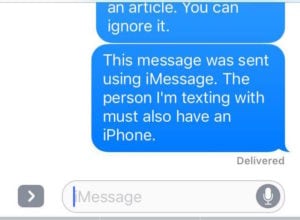
Photo by Gabriel Santiago on Unsplash
If you haven’t recently looked at what secure texting apps are available, now is a good time to take a moment and do that. We here at Person Centered Tech are pleased that the availability of low cost or free, secure, therapist-friendly texting apps has skyrocketed.
Combined with the proliferation of smartphones throughout the developed world, this means there is a critical mass around secure texting that makes it easily available to us mental health private practitioners and our clients.
Read on to learn why we recommend that outside of certain exceptions, clinicians cease using “classic texting” methods with clients and focus on using only secure ones.
Understanding “Classic” Texting
“Classic texting” is how we refer to the texting that comes with our phones and/or phone plans. It’s usually a thing called SMS (or sometimes MMS.) Unmodified Android phones use SMS for all their texting. For iPhone and iPad users, SMS is what you’re using when your text messages are colored green.
Speaking of iPhones and iPads: our definition of “classic texting” includes iMessage, which is what you’re using when your messages turn blue. The secure texting methods listed below should more than suffice as a replacement for iMessage in nearly 100% of cases, though. In short, we recommend you start planning a transition away from using iMessage completely.

A picture of an iPhone screen when sending a message using Apple’s iMessage.
As we’ve said before, “Standards for Technology = Available Technology + Real World Environment.” Secure texting is now too easy and cheap to do to continue justifying the use of classic, HIPAA-unfriendly texting methods (with the notable exceptions listed below).
Using Secure Texting Easily and Cheaply
Secure texting requires these two ingredients:
- Therapist and client both possess smartphones.
- Therapist and client both use the same secure texting app. (In most cases, that means the client will need to download an app.)
When it comes to finding a secure texting app, there are many choices now on the market, some free and some cheap. Person Centered Tech provides reviews to help guide clinicians in making such choices.
The Internet phone (VoIP) service, iPlum, includes a secure texting app that clinicians can use with clients. It’s a great option for a lot of practices.
Solo practitioners should consider the free and open source app called Signal. Please read our full review of Signal before using it. Use of Signal requires some procedural planning on your part, and we strongly recommend against group practices using Signal — the risk management measures you need to implement really only work in a one-person show. When the match is good, however, it’s an excellent choice.
Additionally, a number of paid secure texting apps that supply HIPAA Business Associate Agreements exist on the market. Many of them come with additional features which may make them worth the cost to your practice. Of particular interest are secure email services that provide a mobile app, and the ever-increasing number of practice management systems that supply mobile apps with secure messaging included.
Our free, informative articles are brought to you by Hushmail,
who is offering our readers 15% off for life!
Wondering why this is here? See our sponsorship policy for details.

 Roy says: Hushmail is one of several secure email options that serves health care practitioners like us. Hushmail is highly trusted, affordable, includes secure web forms that accept e-signatures, and has earned a recommendation from us for use by mental health professionals. Learn more about Hushmail for Healthcare and get 15% off for life.
Roy says: Hushmail is one of several secure email options that serves health care practitioners like us. Hushmail is highly trusted, affordable, includes secure web forms that accept e-signatures, and has earned a recommendation from us for use by mental health professionals. Learn more about Hushmail for Healthcare and get 15% off for life.
Handling Initial Contact
Private practice marketing experts have been advising therapists for several years now to include texting as an option for initial contact.
Secure texting has the disadvantage of not supporting one-click contact the way SMS texting does (you can set up a link on your mobile-friendly web site that opens up a new SMS text message when clicked.) Most secure texting apps would need to be downloaded by the potential client before they can use it to converse with you. That’s not so great for greasing the wheels of initial contact.
Secure initial contact through your website can always be done using secure forms. It’s another cheap and easy way to add security to the services you offer clients.
Our favorite secure forms service is Hushmail for Healthcare.
Below is a link to our reviews of numerous ither products that allow you to set up pages where clients can securely send you messages and even file attachments.
Determining When SMS May Be Appropriate

Not everyone is a fan of smartphones!
As much as we are excited about secure texting, we recognize that there are still times when SMS is appropriate. And the HIPAA Omnibus Rule in 2013 validated that when clients understand the risks of texting and still want it, it is acceptable for us to send them texts. Here’s a guideline to help you determine when it might be appropriate:
- There is clinical value in using texting with a particular client at a particular time.
- SMS is the only type of texting that can be used in the situation, due to lack of smartphone or another reason.
- The security risks posed to the client by SMS texting are low enough to be acceptable.
For example, there is a ton of research out there on the effectiveness of text messaging as part of addictions treatment. In nearly all those studies, SMS texting was used to deliver the intervention. Can’t they replace SMS with a secure texting app? Not in these cases. Because they either used government-supplied phones which don’t support smartphone apps, or the researchers used an automated texting system that can only do SMS.
Another time when SMS might work is when the client simply chooses not to own a smartphone, and SMS messaging with the therapist makes sense clinically and in terms of risk management.
For the typical private practitioner, the most common reason to keep using SMS will likely be in automated appointment reminders. In these cases, clinicians should be using a HIPAA-friendly service — meaning one that comes with a Business Associate Agreement — that allows clients to opt in to receiving SMS reminders of upcoming appointments.
Other Considerations and Conclusions
Here are a few important points that are well beyond the scope of this article:
- The modern world of too-many-ways-to-contact-someone strongly necessitates the use of communications policies with clients. Along with the policy, we encourage a discussion of expectations around between-session contact with the therapist. We provide a free Sample Communications Policy here.
- Be careful of the subtle differences between texting as a way to communicate administrative issues like appointment changes, and as a medium for performing telemental health. Without well-established policies around communication, it can be easy to slip into the latter.
- Getting clients onboard with your secure communication methods often hinges on your own familiarity and comfort with the tech. We discussed this in more detail in our article on sticking to secure communications.
We don’t know about you, dear readers, but we’re pretty excited at yet another aspect of our professional lives being well-served by secure and reliable software products. We hope you take advantage of them.

Hello, I have been a subscriber for over a year, however do not recall getting you whole collection of mental health pp form, and consent forms for email and texting. I wondered if you would be willing to email these again? I really appreciate all of your invaluable information and hopeful I can join and take CEU courses this year. Thank You!
Hi Dawn,
Thanks for the kind feedback; we’re so glad you’ve found the information and resources we provide to be helpful. As a subscriber to the free newsletter, all of the forms we provide are available to you for download on your “my free downloads” tab under your “my account” page when logged into our website. You can go directly to that page by clicking here Please let me know if you have any difficulty accessing those and I’ll be glad to be of help.
If you’re considering joining as a member of our Person Centered Tech Support service and learning more about all the features and resources it includes, or would just like direction to our resources that address your specific questions, I invite you to schedule a free resource consultation with me (I’m the Deputy Director.) You can schedule that directly here; or call 503-893-9717 or email [email protected].
I’ll hope to connect with you soon,
Liath